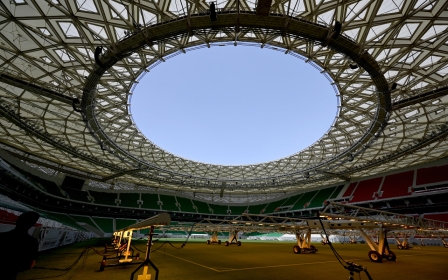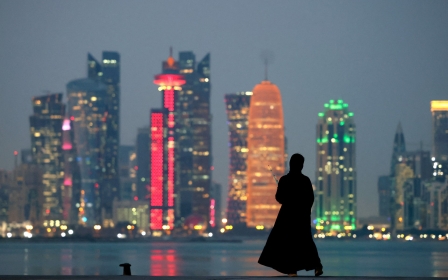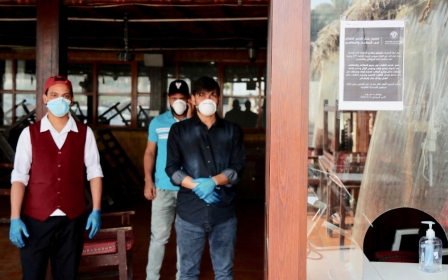Qatar World Cup: Hotel set to host England accused of worker abuse

The hotel set to host England at the Qatar World Cup has been accused of exploiting some of its workers by paying them less than the minimum wage and discriminating against them based on their nationality.
Several workers who spoke to Equidem, a UK-based NGO focused on labour rights, said the Souq Al Wakra hotel had violated workers' rights, as the Gulf state faces pressure to improve labour standards.
Souq Al Wakra is a five-star resort owned by Tivoli hotels located just outside Doha, the Qatari capital, that is reported to have been chosen by England manager Gareth Southgate and the English Football Association as the team’s base for the tournament, which kicks off in November.
Southgate has previously acknowledged concerns from rights groups about poor working conditions and human rights abuses in Qatar but has rejected calls for the England team to boycott the tournament.
The claims made by workers against the Souq Al Wakra hotel include charging contract workers recruitment fees, illegal wage deductions and challenges for workers obtaining no-objection certificates for contract workers - a requirement to change employers.
New MEE newsletter: Jerusalem Dispatch
Sign up to get the latest insights and analysis on Israel-Palestine, alongside Turkey Unpacked and other MEE newsletters
One Indian worker accused Souq Al Wakra of discriminatory behaviour and said promotions at the hotel depended on nationality, not skill or merit. Other workers complained that people from different nationalities who did the same job were paid different amounts.
Other workers alleged that the Souq Al Wakra hotel had fired workers during the pandemic and saw outbreaks of Covid-19 despite workplace precautions.
"During the pandemic, they fired many staff. They told us that within one month, we are going to fire you," another Indian worker told Equidem.
"They paid [for] our tickets to our home countries and gave workers they fired QR 400 [$110] to pay for food until their flight. They did not provide any other payments."
Equidem told Middle East Eye it had spoken to six workers employed in Souq Al Wakra over the last five years. Two workers are presently employed by the hotel, and four are former employees.
The former employees told Equidem that the hotel and agency that employed them had not resolved their grievances despite guidance from FIFA and the Supreme Committee for Delivery and Legacy in Qatar stating that workers should be compensated for labour infractions.
Tivoli, who runs the Souq Al Wakra hotel, did not respond to MEE's requests for comment.
A spokesperson for the English Football Association said: "FIFA provides competing nations with a list of hotels that can be used during tournaments, therefore any questions relating to hotels should be directed towards FIFA, who carry out an auditing process on the accommodation suggested."
"We are carrying out our own due diligence on human rights and will be having separate conversations with hotel management and staff at our preferred England hotel, to ensure that we understand the steps they have taken to meet their legal obligations and to meet the required standards on workers’ rights."
The FA did not comment further on whether England would consider changing its hotel if the hotel had not met its definition of legal obligations or standard of workers' rights.
A FIFA spokesperson said it had implemented a “due diligence process in relation to the protection of workers involved in the FIFA World Cup Qatar 2022 in line with FIFA’s responsibility under the UN Guiding Principles on Business and Human Rights.”
"This work, which is implemented in partnership with the Supreme Committee for Delivery & Legacy (SC) and involves collaborations with trade unions and other independent monitors, focuses on companies building FIFA World Cup infrastructure, including stadiums and training sites, as well as service providers involved in the delivery of the competition, such as in the hotel, security, or transportation sectors.
"In the hospitality sector alone, FIFA and the SC implement a comprehensive audit and inspection programme covering 159 hotels in Qatar.
It added that “hotels who fail to ratify issues identified through the FIFA and SC audit and inspection programme will have their contracts terminated. Any worker who feels their rights are being violated should contact the SC Workers’ Welfare hotline or FIFA’s Human Rights grievance mechanism for the FIFA World Cup.”
A Qatari government spokesperson said instances of worker abuse have declined “year on year as enforcement measures take hold and compliance increases among employers.”
“With new laws in place, the responsibility also rests with companies operating in Qatar, both local and international, to ensure they comply with the new standards,” the Qatari spokesperson told MEE.
“The government works intimately with the business community and has launched several initiatives to ensure all operators understand their legal obligations, and workers are aware of their rights.”
This article is available in French on Middle East Eye French edition.
Middle East Eye delivers independent and unrivalled coverage and analysis of the Middle East, North Africa and beyond. To learn more about republishing this content and the associated fees, please fill out this form. More about MEE can be found here.




